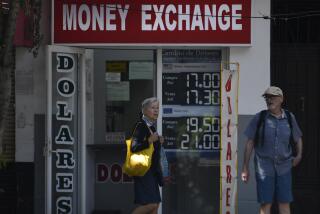Mexican, Not Foreign, Investors Precipitated Peso Crash, IMF Says
- Share via
WASHINGTON — Mexican, not foreign, investors precipitated the spectacular crash of the Mexican peso late last year by staging a crushing last-minute run on their own currency, according to an International Monetary Fund report released Sunday.
The document--the IMF’s first official analysis of the circumstances surrounding the peso’s collapse--challenges earlier portrayals of the crisis by officials in the Clinton Administration, Federal Reserve and the IMF itself.
They had suggested that the peso’s plunge was prompted primarily by foreign investors dumping the Mexican currency in response to political unrest.
In addition, the report:
* Suggests the peso’s collapse posed a relatively modest threat to the stability of the international financial system, contrary to the dire predictions made at the time by U.S. Treasury Secretary Robert E. Rubin and Federal Reserve Board Chairman Alan Greenspan.
* Provides an unusually sympathetic assessment of the use of “capital controls” --restrictions on the flow of money back and forth across national borders--by developing nations seeking to shield their economies from volatility in international financial markets.
In highlighting the role of domestic-capital flight in the peso’s collapse, the IMF report notes that Mexican investors’ net sales of Mexican stocks and bonds surged dramatically in the two weeks before Dec. 20, when Mexican officials abruptly abandoned their longstanding pledge to defend the value of the peso against the dollar.
“The available data show that the pressure on Mexico’s foreign-exchange reserves during 1994, and in particular just prior to the devaluation, came not from the flight of foreign investors or from speculative positions taken by these investors, but from Mexican residents,” the report says.
The report, the IMF’s annual survey of global capital markets, suggests that this exodus of domestic capital set off a downward spiral in Mexican financial markets, making it impossible for the Mexican government to defend the peso.
While that hastened a withdrawal of foreign capital--forcing the Mexican government to the brink of insolvency in late January--the report points out that few foreign investors began unloading Mexican stocks and bonds until well after Dec. 20.
One key lesson, according to the report, is that financial officials in developing countries must devote as much effort to maintaining the confidence of investors at home as they do to wooing Wall Street.
More to Read
Inside the business of entertainment
The Wide Shot brings you news, analysis and insights on everything from streaming wars to production — and what it all means for the future.
You may occasionally receive promotional content from the Los Angeles Times.










